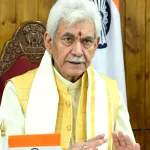India is a civilizational nation that has evolved amid various challenges and defeated fissiparous tendencies with the national resolve to uphold the spirit of Bharat. India may have been the name given by the outsiders to the nation that has proven time to time that we the people are well aware of our originality and the reality of cultural moorings from ancient times. And this internalisation runs in veins of all the Indians that we are the sentinels of the great Bharat that exist beyond the confines of so called modern definitions of history. We the people recognise it well that Bharat is a civilizational nation that cannot be demoralised at any cost. And it is in this realisation that we recognise our duty to sensitise our children and youth to uphold Bharat in every age and every period. The “Watan Ko Jano” initiative meant to familiarise the 250 children from Jammu and Kashmir organised by the Ministry of Home affairs in collaboration with the Government of Jammu and Kashmir under the stewardship of the Home Minister Amit Shah with the social and cultural diversity of Bharat is a welcome move. It was meant to sensitise the children about the dynamic progress made by the nation under the leadership of Prime Minister Narendra Modi to make children identify with the overall national development. Amit Shah has described this initiative as meant to deepen the understanding of the children about their nation in terms of national achievements in the various fields. This initiative was meant to showcase that the neutralisation of Article 370 and 35 A has brought the people of Jammu and Kashmir at par with their counterparts in the rest of India in terms of their rights that were being denied to them earlier. This has strengthened the unity of the nation. Not only that Jammu and Kashmir has witnessed a significant development in education, industry, healthcare and infrastructure. The Home Minister has underlined that this has brought comprehensive transformation in the newly created Union Territory (UT) as the incidents of terrorism have been reduced that includes stone pelting as well. It is pertinent to mention that there was a phase in Kashmir when stone pelting was a norm to express dissent in the mid and late 2000.The patrons of terror easily recruited the youth especially the students to act as the available human resource to catalyse the conflict and use the streets as the theatre of war that witnessed tremendous loss of lives. The children who have travelled to various parts of the nation can act as the ambassadors of national integration and can emerge as the leaders of the conflict-free Kashmir. Such initiatives enable the children to widen their vision and internalise the progressive social norms that can help them to contribute in the national development. Youth exchange programmes between various states has been the norm, And it is one of the best ways to inculcate the values of national unity among the young students who are future leaders to guide the national destiny. There is a need for regular initiatives for to and fro movement of children from Jammu and Kashmir and vice-versa to reinforce the national resolve of brotherhood. Home Minister Amit Shah has been taking keen interest in the internal security and developmental issues of Jammu and Kashmir. This is indeed a praiseworthy policy. People of Jammu and Kashmir look forward for more such initiatives from his office to involve the students from the UT sensitisation of these young minds. So that children from Jammu and Kashmir emerge as the leading contributors in establishing peace and national integrity.
“Watan Ko Jano”-An Initiative to uphold Bharat

Sign Up For Daily Newsletter
Be keep up! Get the latest breaking news delivered straight to your inbox.
By signing up, you agree to our Terms of Use and acknowledge the data practices in our Privacy Policy. You may unsubscribe at any time.
Leave a Comment Leave a Comment
Stay Connected
Latest News
Recent Posts
- J&K floods: Reasi DC seeks explanations from 13 officials absent during relief operations
- GMC Srinagar postpones written test for Counsellor (ATF) to Sep-09
- LG Sinha takes stock of situation in the wake of incessant rain and flood
- MHA team visits Jammu to assess damage in flood-affected region
- KU to remain closed, all exams scheduled by varsity cancelled tomorrow







